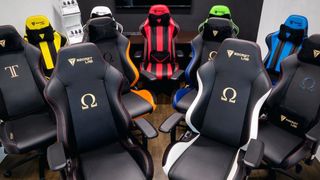The Sony DualSense controller's been given 417 hours to live. My gaming keyboard? 91 years
Sony's dreamy DualSense uses the same sticks as Microsoft and Nintendo's pads, and that means it has the same failures.

Seeing the Sony DualSense controller given just 417 hours to live, I've got to admit to feeling kinda smug about the 800,000 hours my mechanical keyboard could last. Well, so long as I make sure to clean it every 50,000 hours or so anyways.

Best chair for gaming: the top gaming chairs around
Best PC controller: sit back, relax, and get your game on
Yeah, the PlayStation 5's sexy new DualSense controller is officially rated for a four to seven-month lifespan, according to some back-of-a-crushed-cigarette-packet maths calc'd by teardown aficionados, iFixit. That's a startlingly short rated lifetime for a brand new controller for one of the most powerful games consoles ever made. So, what the hell was Sony thinking?
In reality, that's actually just the same failure rate figure as you'll find for every controller, on every console platform for the last five years or more, even with my beloved Xbox One Elite Series 2. That's because all these controllers use the same Alps thumbstick, and its key parts are rated for 2,000,000 cycles.
So, while the headline-grabbing 417 hours lifetime is a pretty startling figure, it's in no way unique to the maligned DualSense controller and its current accusations of untoward drift.
If you want a breakdown of the maths involved in the iFixit statement its analysis is well worth a read, but the short of it is that one of its engineers measured their Call of Duty: Modern Warfare controller interactions and eventually came to a rough figure of 100 full rotation cycles per minute. Giving it the benefit of the doubt, iFixit took that down to a less-intensive 80 cycles per minute, which meant that you would still hit the 2,000,000 cycles figure in 25,000 minutes, or 417 hours.
Distilling that down further we get to a total lifetime of just seven months if you work off a pretty conservative estimate of 2 hours of gaming per day. I mean, who's going outside right now?
It's worth remembering that this is the rated lifespan of that particular component, the potentiometer which senses the actual movement of the thumbstick. That doesn't equate to a hard stop at 2,000,000 cycles, but is a sort of average time before it starts failing… or drifting. You might well have a controller used that intensively which lasts way longer, or one that falls flat well before you get to that point.
The biggest gaming news, reviews and hardware deals
Keep up to date with the most important stories and the best deals, as picked by the PC Gamer team.

Either way, that figure is a long way off what the best gaming keyboards are rated for. Your basic Cherry MX mechanical keyboard switch is rated for 50,000,000 clicks, and your keys don't take the same sort of individual hammering a single thumbstick does during gaming. If we take a look at a rough guestimate on keyboard usage, you're maybe looking at something like 1,500 hits of the space bar per day, which is often the most used individual switch.
That then gives you a failure time for your keyboard switches of a little over 91 years. Think of the amount of skin, Cheetos, and general gamer grint that will end up packed under your keys in 91 years. Eww.
I've also got a better chance of fixing my keyboard, while the DualSense is going to need more soldering skills than I have at my disposal. My current board du jour is the Mountain Everest Max which uses easily swappable mechanical key switches too. So if I find my S key crapping out, because I'm constantly backing away from fights in Battlefield V, I can quickly pull it out for a new switch at the cost of just a couple bucks.
Okay, I've recently dropped $50 on a set of Halo True switches to go into the Everest base, because I'm easily influenced and Jacob is persuasive, but that's not the point.
But then you also have something like the Razer optical switches which claim a lifespan of 100 million clicks. That could make your 180 year-old Huntsman Elite a board you can pass down through the generations to your hipster great-grandson, the one who takes pride in still using physical interfaces while the wannabe gamers are getting all giddy over mind control.

Dave has been gaming since the days of Zaxxon and Lady Bug on the Colecovision, and code books for the Commodore Vic 20 (Death Race 2000!). He built his first gaming PC at the tender age of 16, and finally finished bug-fixing the Cyrix-based system around a year later. When he dropped it out of the window. He first started writing for Official PlayStation Magazine and Xbox World many decades ago, then moved onto PC Format full-time, then PC Gamer, TechRadar, and T3 among others. Now he's back, writing about the nightmarish graphics card market, CPUs with more cores than sense, gaming laptops hotter than the sun, and SSDs more capacious than a Cybertruck.
Most Popular






